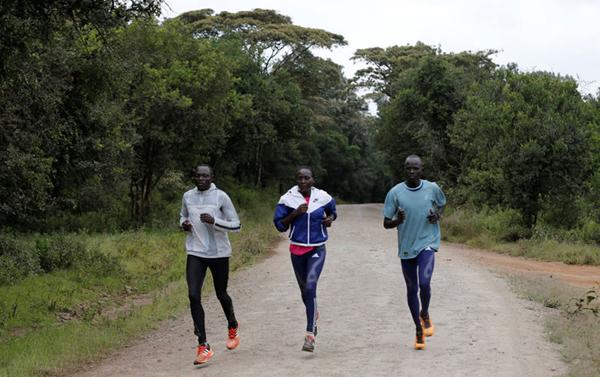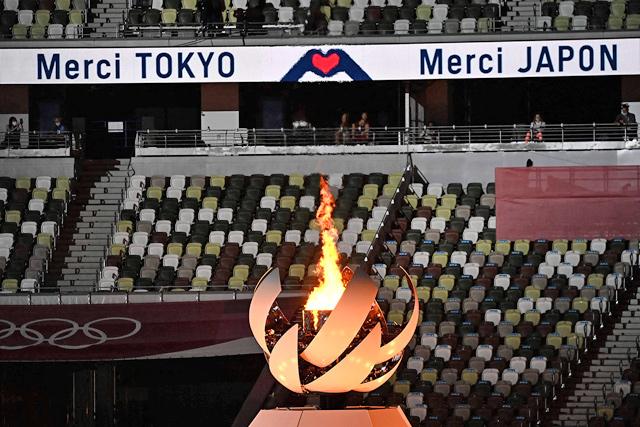You are here
Refugees primed to pump up Rio Games feel-good factor
By Reuters - Jul 25,2016 - Last updated at Jul 25,2016

Athletes from South Sudan, part of the refugee athletes who qualified for the 2016 Rio Olympics, run along a dusty road during a training session at their camp in Ngong township near Kenya’s capital Nairobi, in this undated photo (Reuters photo)
BERLIN — When record Olympic champion Michael Phelps and the king of sprinting Usain Bolt resume their hunt for world records and gold medals at the Rio de Janeiro Olympics next month they will not be the only big stories in town.
A team of refugees, hand-picked by the International Olympic Committee (IOC), is expected to hog the spotlight from the very first day when they march as an independent team into the Olympic Stadium just before hosts Brazil at the opening ceremony on August 5.
The IOC in June unveiled its first team of refugees which will have 10 members and 12 officials and will compete under the Olympic flag, as part of its decision to highlight the plight of refugees worldwide.
More than a million refugees streamed into Europe in the past year alone as they fled fighting in Syria and other countries.
Millions more are housed in camps in countries across the world, having escaped dozens of wars or armed conflicts in their home nations.
The Refugee Olympic Team (ROT) includes five athletes from South Sudan, two from Syria, two from Democratic Republic of Congo and one from Ethiopia.
“These refugees have no home, no team, no flag, no national anthem. We will offer them a home in the Olympic Village together with all the athletes of the world,” IOC President Bach said.
“The Olympic anthem will be played in their honour and the Olympic flag will lead them into the Olympic Stadium. This will be a symbol of hope for all the refugees in our world, and will make the world better aware of the magnitude of this crisis.”
The athletes, six men and four women, will compete in the sports of swimming, judo and athletics.
‘Great things’
They include swimmer Yusra Mardini from Syria who trains in Germany, South Sudanese middle-distance runner Rose Nathike Lokonyen, living in a refugee camp in Kenya, and Democratic Republic of Congo judoka Yolande Bukasa Mabika who trains in Brazil.
“I want all refugees to be proud of me, I want to encourage them that even if we are not in our homeland and had a tough way that we can still do great things,” Mardini said.
An initial 43 potential candidates were identified with final selection of the 10 based on consultation with their host National Olympic Committees (NOCs), international federations, the UNHCR and the NOCs of their countries of origin.
Nomination criteria also included sporting level, official refugee status verified by the United Nations, and personal situation and background.
The team will be housed in the Olympic Village along with the other 11,000 athletes.
The IOC decision to include an entire refugee team made of athletes with different nationalities is unique.
But other athletes have competed under the Olympic flag, with some Yugoslavs at the 1992 Games in Barcelona doing so during the break-up of their country.
South Sudan also had one athlete at the 2012 Games racing under the Olympic flag with the fledgling nation at the time having yet to set up an Olympic Committee.
The refugee team has already attracted widespread media attention and is expected to provide one of the feel-good stories of the Games, with their participation alone being a far bigger achievement than any of Bolt or Phelps’ medals.
Related Articles
AMMAN — Three-time Olympian Nadin Dawani is one of 24 athletes from across the world to have been approved to run for the International Olym
TOKYO — The Tokyo 2020 Games were declared closed by International Olympic Committee (IOC) chief Thomas Bach on Sunday, ending the “most cha
GANGNEUNG, South Korea — Kirill Kaprizov scored in overtime to lead the Olympic Athletes from Russia (OAR) past a feisty Germany 4-3 on Sund
















